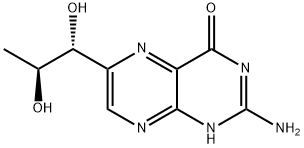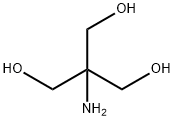6-Biopterin , 2mMinDMSO , 22150-76-1
Synonym(s):
(1’R,2’S)-Biopterin;L -erythro-6-(1,2-Dihydroxypropyl)pterin;2-Amino-4-hydroxy-6-(1,2-dihydroxypropyl)pteridine
CAS NO.:22150-76-1
Empirical Formula: C9H11N5O3
Molecular Weight: 237.22
MDL number: MFCD00036787
EINECS: 244-807-8
| Pack Size | Price | Stock | Quantity |
| 1ml | RMB239.20 | In Stock |
|
| others | Enquire |
PRODUCT Properties
| Melting point: | >210°C dec. |
| alpha | D24 -50° (c = 0.4 in 0.1N HCl); D24 -26° (c = 0.92 in 0.1N NaOH) |
| Boiling point: | 379.74°C (rough estimate) |
| Density | 1.3472 (rough estimate) |
| refractive index | 1.7610 (estimate) |
| storage temp. | 2-8°C |
| solubility | Aqueous Acid (Slightly, Heated, Sonicated) |
| form | White to pale yellow powder. |
| pka | 13.18±0.20(Predicted) |
| color | White to Light Yellow |
| Merck | 13,1229 |
| BRN | 87860 |
| Stability: | Hygroscopic |
| CAS DataBase Reference | 22150-76-1(CAS DataBase Reference) |
Description and Uses
6-Biopterin (L-Biopterin) is the oxidized form of tetrahydro-L-biopterin (BH4), a nitric oxide synthase (NOS) cofactor. L-Biopterin can be reduced to BH4 via thioredoxin reductase followed by dihydropteridine reductase or reduced glutathione. It is extremely toxic to human melanocytes in culture (IC50 = 0.2 μM after 48 hrs). L-Biopterin is rarely found under physiological conditions except in the epidermis of patients with the depigmentation disorder Vitiligo.
L-Biopterin is a pteridine widely distributed in nature; naturally occurring as the L-erythro-form. Considered as a growth factor for some insects. Fluoresces with a blue color in alkaline solution.
Safety
| Symbol(GHS) |  GHS07 |
| Signal word | Warning |
| Hazard statements | H315-H319-H335 |
| Precautionary statements | P261-P305+P351+P338 |
| Hazard Codes | Xi |
| Risk Statements | 36/37/38 |
| Safety Statements | 26-36 |
| WGK Germany | 3 |
| RTECS | UO3506000 |
| F | 10-23 |
| HS Code | 29339900 |
| Toxicity | sln-par-dmg 10 mg/L MUREAV 128,147,84 |



